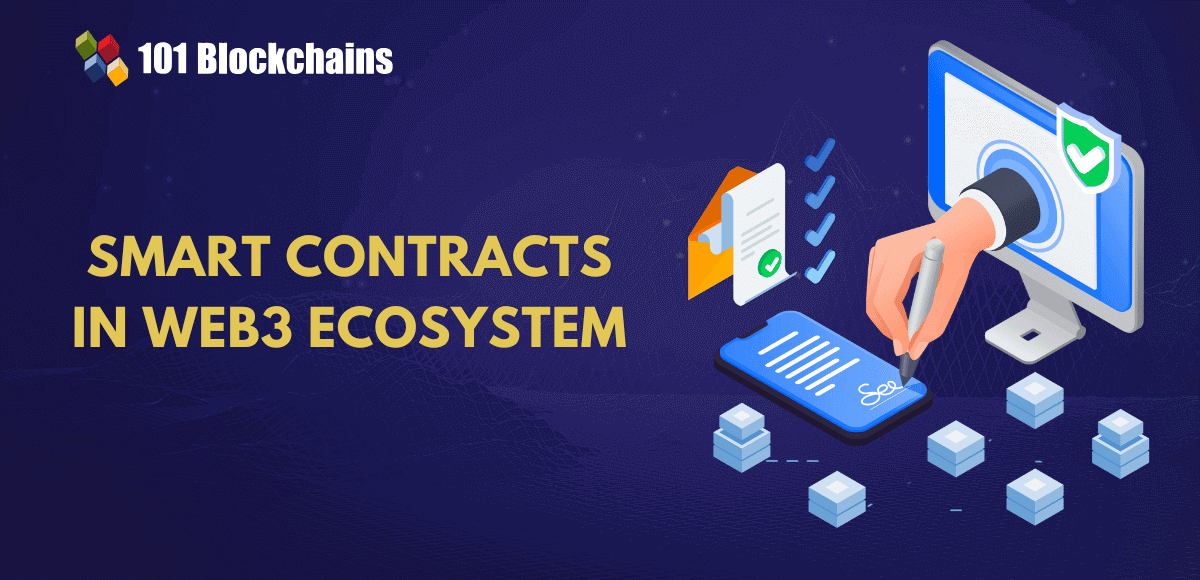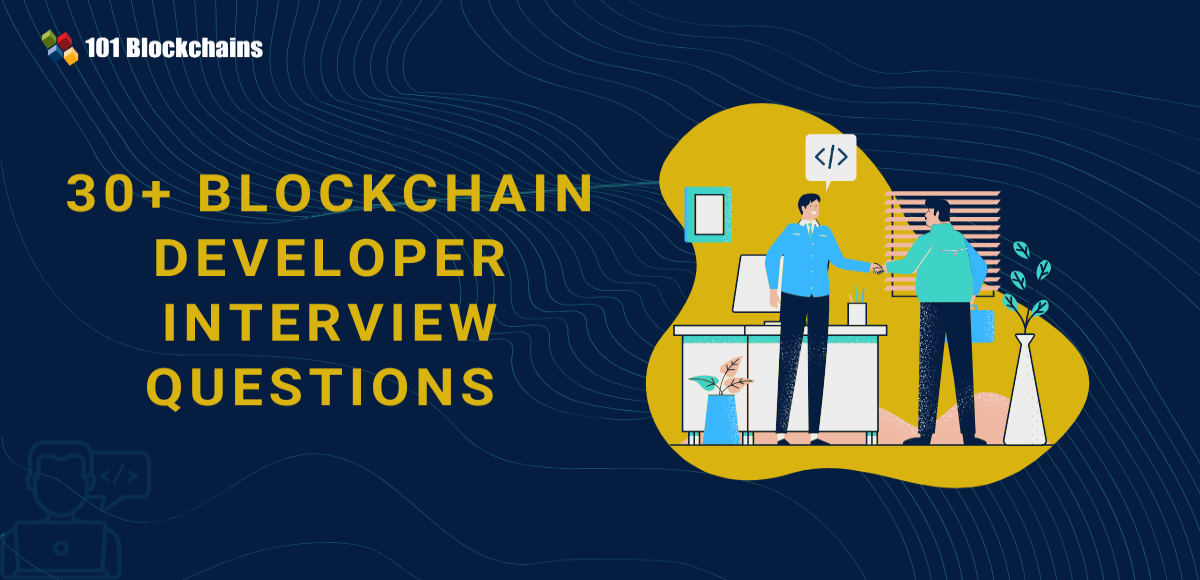Learn how blockchain truly works, master key definitions, and uncover what makes smart contracts so "smart." Dive into the fundamentals, gain valuable insights, and start your blockchain journey today!

- Interview Preparation
Georgia Weston
- on February 13, 2023
Top 20 Solidity Interview Questions and Answers
Smart contracts are an integral highlight of the blockchain landscape, considering their role in facilitating blockchain programmability. Ethereum is the first blockchain that introduced the option for programming smart contracts on blockchain networks for different use cases. Therefore, the Ethereum-based Solidity language has become a popular choice for smart contract developers. If you want to become a smart contract developer, then Solidity interview questions must be an important part of your preparations.
The blockchain industry could grow at an impressive rate of 85.9% from 2022 to 2023. Therefore, the demand for Solidity programming language would only continue to increase in the future. The massive potential of the blockchain industry and the web3 use cases of smart contracts indicate favorable opportunities for smart contract developers. Apart from training courses and professional certifications, aspiring candidates must also prepare for interview questions.
Initially developed for smart contract programming on Ethereum, Solidity has emerged as a promising choice for developing other EVM-compatible blockchains. If you want to become a Solidity developer, you can find similarities between Solidity and high-level languages such as Python, C++, and JavaScript. You have arrived at the right place to learn about the important interview questions on the smart contract programming language.
Are you aspiring to learn the fundamentals of the Ethereum Virtual Machine and smart contracts’ upgradability? Enroll now in the Advanced Solidity Development Course.
Why Should You Learn Solidity Interview Questions?
The most prominent concern for a beginner would be about the reasons for learning interview questions for Solidity developer or infrastructure engineer jobs. Without any reasons to invest your time and effort in learning Solidity programming questions, you are less likely to pursue training in Solidity. Here are some important reasons for learning interview questions on Solidity.
-
Disruption by Smart Contracts
The high-level contract-oriented programming language was developed in 2014 by The Ethereum Foundation. Prior to Ethereum and Solidity, blockchain was believed to be restricted to cryptocurrency applications.
Solidity changed the blockchain landscape by offering flexible tools for developing smart contracts to deploy decentralized applications across multiple sectors. With over 44 million smart contracts on the Ethereum blockchain, the demand for smart contract experts is clearly evident.
Curious to understand the complete smart contract development lifecycle? Enroll now in Smart Contracts Development Course
-
Shortage of Solidity Experts
Another important concern for aspiring Solidity learners is evident in questions like “Are Solidity Devs in demand?” as they would be worried about career opportunities. Interestingly, Solidity is still young in comparison to other popular high-level programming languages. It has garnered a significant user base and is easy to learn for web2 programmers.
On the other hand, smart contract programmers could also explore other alternatives such as Rust. However, the shortage of developers in the web3 domain has been fuelling the demand Solidity jobs among aspiring blockchain professionals. The substantial productive improvements planned in web3 ventures require Solidity programming talent. Therefore, the demand for Solidity developers and engineers would expand radically over the coming years.
-
Lucrative Salary Estimates
The interest in learning about the Solidity programming language has been escalating gradually with the growing adoption of blockchain and smart contracts. Crypto startups are seeking new ways for leveraging smart contracts in unique use cases while popular brands are using smart contracts to transform their existing systems and processes. Therefore, they need Solidity experts with the skills to help them with blockchain and web3 projects.
The demand for Solidity developers and engineers has been increasing by huge margins, with promising improvements in salary estimates. The average annual salary of a junior Solidity developer ranges between $70,000 and $110,000. On the other hand, a principal Solidity developer could fetch annual salaries ranging from $150,000 to $200,000.
Build your identity as a certified blockchain expert with 101 Blockchains’ Blockchain Certifications designed to provide enhanced career prospects.
Most Popular Solidity Interview Questions
The clear explanation for “Are Solidity devs in demand?” shows that you can pursue favorable career prospects with Solidity expertise. However, lack of preparation could affect your chances of landing up a good Solidity-based job role. Let us take a look at the important interview questions you must prepare to qualify as the right candidate for Solidity developer or engineer jobs.
Basic Solidity Interview Questions
The first stage of your preparation for Solidity jobs would start with learning about the important highlights in Solidity fundamentals. Here are some of the basic questions you would find commonly in Solidity interviews.
1. How will you describe Solidity?
Solidity is a high-level contract-oriented programming language created by The Ethereum Foundation for developing smart contracts. It is the most preferred programming language for deploying smart contracts in the Ethereum blockchain ecosystem. In addition, the Solidity programming language also incorporates elements from other popular languages such as C++, JavaScript and Python for targeting EVM-based development.
Want to get an in-depth understanding of Solidity concepts? Enroll now in Solidity Fundamentals Course
2. What is the significance of smart contracts on Ethereum?
Smart contracts are digital versions of physical agreements between two parties. In the case of Ethereum, smart contracts can offer the foundation for automatic transaction fulfillment on the network without intermediaries. You can expect queries on such basic concepts in Solidity engineer interview questions for evaluation of your fundamental knowledge regarding Solidity use cases. Smart contracts are important for Ethereum owing to the benefits of speed, immutability, and cost-effective transactions. As a matter of fact, smart contracts serve as integral blocks of the gradually expanding web3 ecosystem.
3. What are the important features in Solidity?
The important highlights of Solidity include the support for contracts, libraries, and inheritance. You can find Solidity developer interview questions focused on features of Solidity for testing your knowledge of Solidity basics. Another important feature of Solidity is the facility for developing custom data types, which serves an essential role in smart contract development.
Excited to learn the basic and advanced concepts of ethereum technology? Enroll Now in Ethereum Technology Course
4. How is Solidity relevant for real-world use cases?
The capabilities of Solidity for smart contract development offer a clear impression of its relevance for real-world use cases. Awareness of use cases is an essential requirement for Solidity jobs in different roles. Solidity smart contracts would run without any third-party interference or possibilities of fraud. The programming language could help you develop different applications, including simple smart contracts as well as complex decentralized applications or dApps. Some of the notable use cases of Solidity could include crowdfunding platforms and voting systems. On the other hand, Solidity can also help in developing token systems, lending platforms, and decentralized exchanges.
5. What is machine code in Solidity?
The basic Solidity programming questions are also an important part of the fundamental test of your knowledge. Solidity developers or engineers can understand Solidity contracts only with an understanding of machine code and its functionality. Machine code refers to the smart contract code executed on the processor. Solidity smart contracts are scripted in human-readable language which must be compiled into machine code for the EVM to understand. The common term for machine code in Solidity is EVM bytecode. It does not have an abstract syntax and the instructions are simple for enabling easier execution.
6. How is Solidity different from Python, C++ and Java?
The interview questions about Solidity programming language would also focus on its differences with other programming languages. One of the significant differences between Solidity and other programming languages is the application method. Python, C++ and Java have been tailored for developing centralized applications. On the other hand, Solidity leverages the Ethereum Virtual Machine for developing and deploying smart contracts.
Want to learn the basic and advanced concepts of Ethereum? Enroll now in Ethereum Development Fundamentals Course
7. Which compiler is used for Solidity?
The collection of basic Solidity interview questions would also include references to the choice of compiler for Solidity smart contracts. As of now, Solidity has not been standardized completely and it does not have an official reference compiler. However, smart contract developers can use the Solidity Compiler by the Ethereum Foundation for compiling Solidity code. Developers can access Solidity Compiler in the form of a web-based compiler and a command-line tool. Solidity Compiler does not feature backward compatibility with previous Solidity versions.
8. What is Pragma directive in Solidity?
The Pragma directive is the first line in the Solidity code, which informs the version for which the source code is created. For example, it would indicate that the source code has been developed for Solidity version 0.4.0 alongside the new versions which do not differ in functionality. You can answer such Solidity engineer interview questions by pointing out that the pragma directive is local for a specific source file. In the event of importing another file, the pragma directive of the incoming file would not apply to the importing file.
9. How do you define a Solidity Contract?
The contract is the backbone of the Solidity language. It is the collection of code and data which is stationed at a particular address on the Ethereum blockchain. The code in the Solidity contract refers to the functions and the data refers to the state of the smart contract. The individual components of the smart contract play a crucial role in the declaration of a state variable. In addition, the contract components also include function modifiers and help in retrieving variable values.
Want to know about the use cases of using Solidity for smart contracts? Check out Introduction To Solidity Presentation
10. What are reserved keywords in Solidity?
The fundamental Solidity programming questions also shed light on reserved keywords in the smart contract programming language. Reserved keywords are important tools for supporting beginners in learning the use of Solidity. The reserved keywords can help in the accurate and correct identification of suitable requirements for developing Solidity code. Some of examples of reserved keywords include abstract, apply, after, auto, switch, typedef, macro, inline, sizeof, unchecked, and many others.
Programming-based Solidity Interview Questions
Apart from the fundamental questions, candidates preparing for Solidity jobs must also familiarize themselves with programming-related questions. Here are some advanced questions you could come across in interviews for Solidity-related job roles.
11. Which types of data types are supported on Solidity?
Solidity offers support for all common data types found in other popular high-level languages. The Boolean data type is a binary data type that returns 1 or 0 according to the status of the condition. Integer data type helps in signing or unsigned integer values while supporting runtime exceptions alongside ‘uint256’ and ‘uint8’ keywords. The String keyword helps in denoting a strong with single or double quotes. Array data type helps in defining single as well as multidimensional arrays. The Modifier data type can help in verifying the rationality of conditions before executing smart contract code.
12. How many types of variables can you use in Solidity?
The technical Solidity developer interview questions also test your knowledge of variables used in Solidity. Solidity offers support for three variable types such as state variables, local variables, and global variables. The state variables have permanently stored values in contract storage. Variables that have values for the duration of execution of a function are known as local variables. The global variables are special variables in the global namespace and help in obtaining information regarding the blockchain.
13. What is the scope of Solidity variables?
The scope of Solidity variables is also one of the important aspects of programming-based interview questions. The scope for local variables in Solidity programming language is restricted to the function for which they have been defined. On the other hand, state variables could have three different types of scope such as public, private and internal. The public state variables provide facilities for accessing internally and through messages. Private state variables offer access only through internal processes from the existing contract for which they have been defined. Internal state variables facilitate internal access from the existing contracts as well as derived contracts.
14. How many types of operators can you find in Solidity?
The list of common Solidity engineer interview questions would also focus on operators used in Solidity. Operators are important components for facilitating different functions in the Solidity logic. Solidity offers support for different operators such as arithmetic operators, comparison operators, bitwise operators, conditional operators, logical operators, and assignment operators.
15. What is the significance of arrays in Solidity?
Array refers to a data structure, capable of storing a specific size of a sequential assortment of elements, belonging to the same type. Another simpler definition of array presents it as a set of similar types of variables. Users can index the elements in an array for easier identification. In the case of Solidity, arrays could also support dynamic size with all the arrays holding contiguous memory locations. Arrays in Solidity share their borders. The lowest address in a Solidity array points to the first element while the highest address refers to the last element.
16. Can you use loops in Solidity?
Loops are an important aspect of programming languages and Solidity is not an exception to loop. The applications of loops are evident in scenarios where developers have to perform a specific action repetitively. Loop statements could help in reducing the number of lines required in the code for easier smart contract programming with Solidity. You can answer such Solidity programming questions by mentioning While loop, Do…While loop and For loop. The While loop is the most basic loop for Solidity programming. The Do…While loop facilitates condition checking at the end of the loop. For loop serves the requirements of complex looping in Solidity. In addition, Solidity also offers complete control over the loops and switch statements.
17. What is the ABI of a Solidity smart contract?
The ABI of a smart contract is the interface that helps in interacting with the contract. The smart contract ABI in Solidity is a JSON-based document, facilitating the description of functions, types, and events, alongside other ABIs associated with the contract. Smart contract ABI also offers documentation for developers and users interested in interacting with the contract.
18. Do you know about tools for Solidity code testing?
The advanced questions for Solidity jobs also evaluate your knowledge about suitable tools for testing smart contract logic. You can find a selected range of options for testing Solidity smart contract code. However, the most popular testing tools for Solidity include Truffle and Solium. Truffle provides a comprehensive development environment and testing framework along with an asset pipeline for deploying smart contracts on Ethereum. On the other hand, Solium is an application for identifying and resolving issues regarding Solidity code.
Start learning Smart Contracts and its development tools with World’s first Smart Contracts Skill Path with quality resources tailored by industry experts Now!
19. What are the recommended safeguards against re-entry attacks?
You are also likely to encounter Solidity developer interview questions related to security risks. The first solution for re-entry attacks involves lowering balances alongside updating other state variables prior to invoking other contracts. You can also opt for re-entry guards, which can use a variable for determining the position of a call in the stack. Another recommended safeguard against re-entry attacks would refer to limits on gas available for called contracts.
20. Are libraries important in Solidity?
Libraries play an important role in ensuring the benefits of resource effectiveness for Solidity. The library is a segment of code that is available for reusability so that other smart contracts can use them without writing new code from scratch. The two distinct types of libraries in Solidity include deployed and embedded libraries. Deployed libraries feature their individual address and multiple smart contracts could utilize them. On the other hand, embedded libraries work only for the concerned smart contract.
Want to know real-world examples of smart contracts and understand how you can use it for your business? Check the presentation Now on Examples Of Smart Contracts
Bottom Line
The staggering growth in demand for smart contract developers has invoked curiosity in learning Solidity. You should build the knowledge and skills required to answer Solidity interview questions with confidence for landing your desired job roles. Candidates should prepare comprehensively for the basic and programming-related questions on Solidity for ensuring success. Most important of all, you must choose effective training resources for developing your expertise in smart contracts and Solidity development. Find the best training courses on Solidity fundamentals and start learning to build expertise.
*Disclaimer: The article should not be taken as, and is not intended to provide any investment advice. Claims made in this article do not constitute investment advice and should not be taken as such. 101 Blockchains shall not be responsible for any loss sustained by any person who relies on this article. Do your own research!






